The Best Regional Shows of 2022
Here are the shows outside of New York City that we really loved this year.
2022 was the year live theater returned, in earnest, across the country following the pandemic. We polled some of our critics across the country for their thoughts on the best productions they saw this year in their own necks of the woods. Here, in alphabetical order, is what they had to say.
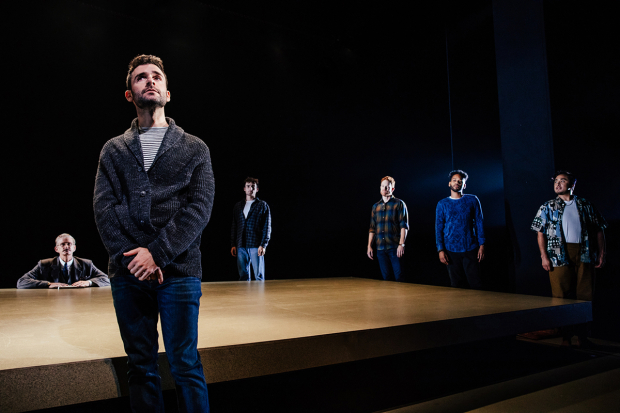
(© Jeff Lorch)
The Inheritance (Geffen Playhouse, Los Angeles)
A sprawling and yet strangely intimate tale, The Inheritance chronicles the gay experience at the beginning of the new millennium. A generation has been stolen due to the AIDS epidemic at the end of the last century, and this next generation is hungry for mentors. Several characters have lost their way, while others find new direction, thanks to the teachings of those few that survived the earlier pandemic. The two-part drama galvanizes the audience, a credit to Matthew Lopez's insightful writing, Mike Donahue's sensitive direction, and authentic portrayals from a cast featuring Bill Brochtrup, Adam Kantor, and Tuc Watkins. It's the finale of part one that truly devastates, though — a simple scene of introductions among characters turns into an emotional release for the audience, not only those elders who lost many loved ones to AIDS, but the younger men who bear concrete witness to the sacrifices that paved their way. — Jonas Schwartz
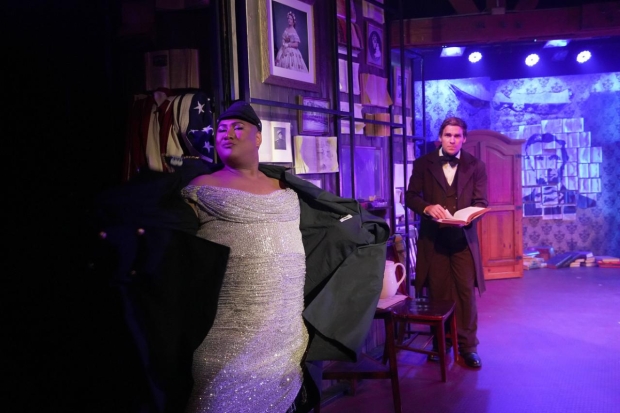
(© Jenny Graham)
Lavender Men (Playwrights' Arena and Skylight Theatre Company, Los Angeles)
Roger Q. Mason is a burgeoning voice of the new world order. A proudly queer artist, Mason brings fresh color to the theatre pallet, demanding to be seen and understood. Lavender Men refocuses history through a queer lens. Though on the surface about a homosexual relationship between 16th President Abraham Lincoln and his friend Elmer, Lavender Men truly represents the rage bubbling to the surface by those who have been ignored for too long. At a time when a government is desperate to erase a generation of progress, Mason and the character they play — Taffeta — refuse to drift backwards. They demand their place at the table, along with every other disenfranchised American. — Jonas Schwartz
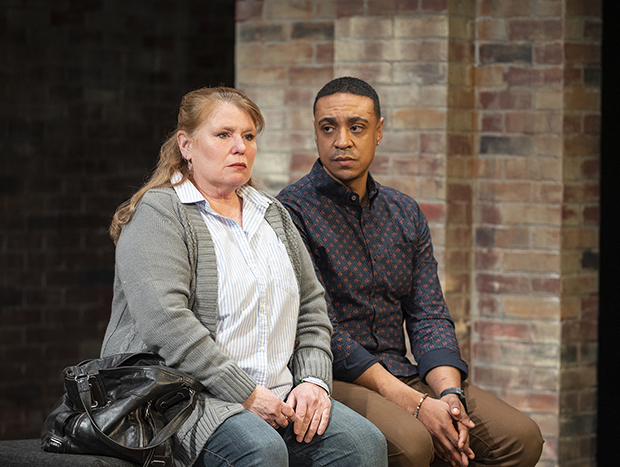
(© Michael Brosilow)
The Luckiest (Raven Theatre Company, Chicago)
Wonderful acting, a powerful play, and astute direction made The Luckiest one of the year's best, as presented by Raven Theatre last spring in its long-awaited return to live production. This three-hander by Melissa Ross starts as a buddy comedy of sorts—straight woman and gay best friend—until the young woman contracts ALS, and becomes the center of an emotional tug-of-war between mother and friend, who becomes her caregiver. Given the serious subject matter, The Luckiest, surprisingly, also was laugh-out-loud funny, as staged by Raven artistic director Cody Estle. The play impressively balanced emotional depth with entertainment, achieving dramatic weight usually missing from a three-character work. As performed by Cassidy Slaughter-Mason as the woman, Christopher Wayland as her friend and Tara Mallen as Mom, it really gob-smacked viewers in the best sense. — Jonathan Abarbanel
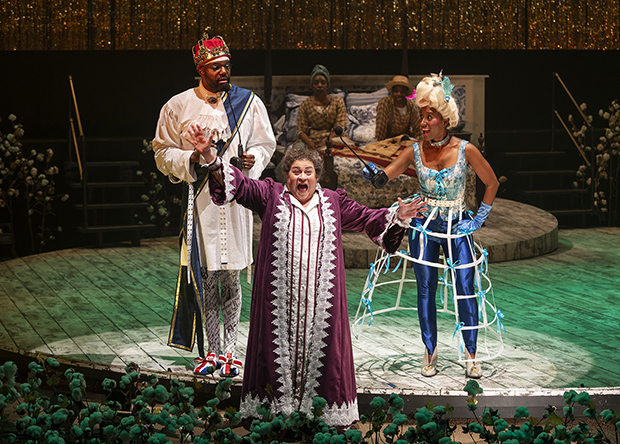
(© Michael Brosilow)
The Most Spectacularly Lamentable Trial of Miz Martha Washington (Steppenwolf Theatre Company, Chicago)
This 2013 play by recent Pulitzer Prize winner James Ijames had its Chicago debut at Steppenwolf Theatre Company in September, and proved to be a meaty yet ebulliently-theatrical show under director Whitney White, who approached this non-realistic play as if it were a musical, driving it along with a fast pace, wonderfully choreographed movement, and striking stage pictures. Her seven cast members were physically fluid and vocally sharp. Inspired by fact, Miz Martha Washington was a satirical history pageant about our first First Lady and her enslaved workers, one of whom very likely was her illegitimate half-sister. That potent connection was used to examine the emotional and psychological roots of enslavement among both those enslaved and those who owned slaves, all in just 90-minutes, dressed in highly-theatrical devices and exaggerations. — Jonathan Abarbanel
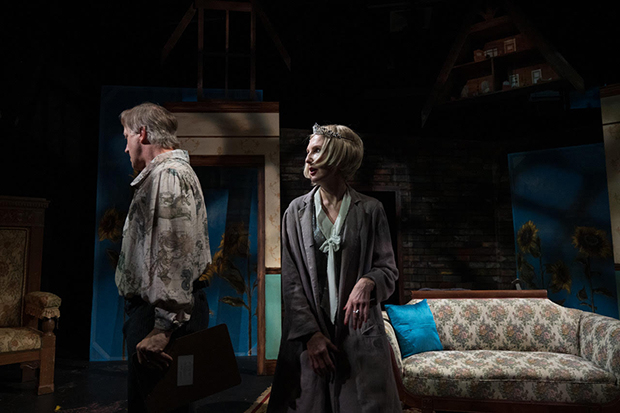
(© Johanna Austin)
The Two-Character Play (Idiopathic Ridiculopathy Consortium, Philadelphia)
As the company's whimsical name suggests, Idiopathic Ridiculopathy Consortium specializes in the absurdist canon, but in recent seasons, artistic director and leading lady Tina Brock has turned her eye to Tennessee Williams. The results have often been thrilling, bringing themes of societal repression and unfulfilled longing to the fore. But I've never seen the troupe's specific lens more successfully applied than in their production of The Two-Character Play, a confounding late-career meditation on art, aging and loss. Brock and co-star John Zak scintillatingly embodied a louche, desultory pair of touring actors who find themselves before a hostile audience in the Deep South, and who let their personal traumas overwhelm their professionalism in a go-for-broke improvised performance. Funny and fearless, they brought clarity and dark humor to the work, and showed how much of Williams's signature poetic voice remained in his later, experimental plays. — Cameron Kelsall
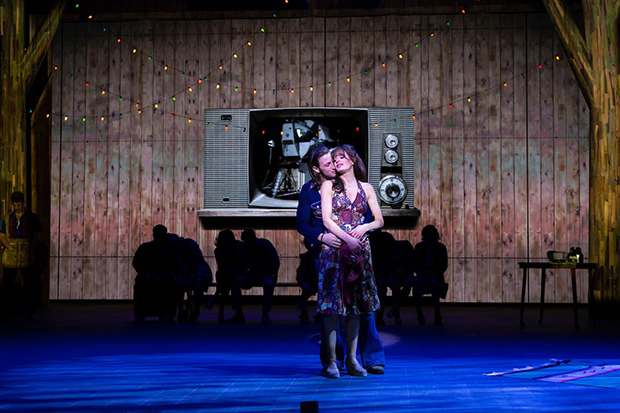
(© T Charles Erickson)
A Walk on the Moon (George Street Playhouse, New Jersey)
Delayed two years by the pandemic, this musical adaptation of the 1999 film by the same name achieved liftoff at George Street Playhouse this spring. The score, by Paul Scott Goodman and AnnMarie Milazzo, stylishly fused elements of 1960s music, with rock, soul, doo-wop and folk creating an authentic sound world. Working from her original screenplay, Pamela Gray crafted a literate libretto that fleshed out the characters spending the summer at a Jewish bungalow colony in the Catskills: their deferred dreams and frustrated desires, along with the promise of hope brought on by the moon landing, Woodstock, and the new decade on the horizon. As Pearl Kantrowitz, a fiercely intelligent woman stifled by the comfortable confines of her middle-class life, longtime Wicked favorite Jackie Burns finally found an original role worthy of her prodigious talents. — Cameron Kelsall










